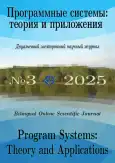Vol 16, No 3 (2025)
Quantum machine learning methods for intrusion detection in software-defined networks
Abstract
Software-defined network architecture is the preferred way to build large computer networks that require high responsiveness to change and a high degree of automation. The main feature of this architecture is the centralized management of the entire network from a single controller. However, this approach opens new opportunities for attacks on the network, making the controller their main target. This paper explores the possibility of applying quantum machine learning models to detect such attacks.
Program Systems: Theory and Applications. 2025;16(3):3-22
 3-22
3-22


Strong control improvement method for non-homogeneous discrete systems
Abstract
The class of non-homogeneous discrete systems (NDS) with intermediate criterions is considered. These systems are two-level and are prevalent in practice. They can be also obtained via discretization of continuous systems in the process of solving optimization problems using iterative methods. For this class of systems a strong improvement method of the second order is constructed based on the analogue of Krotov type sufficient optimality conditions.The authors of the article question the assertion that for classical discrete control systems, as well as for heterogeneous ones, there is no sense in introducing the concept of a strong relative minimum. Therefore, when constructing an improvement method, we put forward the requirement of proximity of neighboring approximations from the class of admissible only by the process states at both levels. The resulting method contains a vector-matrix two-level system for conjugate variables. The increment of controls at each level linearly depends on the corresponding states, which allows finding a solution in the form of approximate linear synthesis of optimal control.The method was tested on two illustrative examples, which showed its efficiency. The application of the developed method to a more complex example allowed us to obtain a smaller value of the functional than that found earlier by a similar in structure minimax improvement method.
Program Systems: Theory and Applications. 2025;16(3):23-40
 23-40
23-40


Performance and fault tolerance of the ideal system network via additional parallelity
Abstract
The article considers methods for increasing the performance of system networks by increasing their parallelism in two ways: using their copies and parallel channels in each copy. The article considers methods for constructing non-blocking system networks with direct channels of arbitrary size. The article considers methods for constructing non-blocking networks with a given number of parallel channels as networks with the structure of quasi-complete graphs. The article considers a method for constructing system networks of any size with a given number of parallel channels by using the corresponding number of their copies.
Program Systems: Theory and Applications. 2025;16(3):41-68
 41-68
41-68


Identifying healthy and diseased areas of plant leaves using neural networks
Abstract
This paper presents a study aimed at developing a neural network method for detecting healthy and diseased areas of plant leaves based on their images and calculating the ratio of their areas. The basic network of the FPN architecture with an encoder in the form of the ResNet-34 architecture was used as a neural network model. To train the ANN, binary masks of target areas of plant leaves were used as labels; they were obtained programmatically without manual marking. Due to this, it was possible to achieve a reasonable compromise between the resources required to create masks and their accuracy. When training the neural network model, the accuracy of 96.5% and 78.9% was achieved according to the F1 metric for determining healthy and diseased areas, respectively. Next, the model was inferred, as a result of which the "health" index was calculated for each of the studied leaf images. In the context of the problems being solved, the "health" index is the difference between the percentages of healthy and diseased areas, which can be used to assess the severity of the disease, as well as to monitor the dynamics of the disease as an indicator of the effectiveness of the drugs or care methods used. The scientific novelty of the presented study lies in the creation of a method for automatically determining the ratio of healthy and diseased leaf areas, which combines modern computer vision technologies, machine learning and practical applicability for agronomy and plant growing.
Program Systems: Theory and Applications. 2025;16(3):69-97
 69-97
69-97











